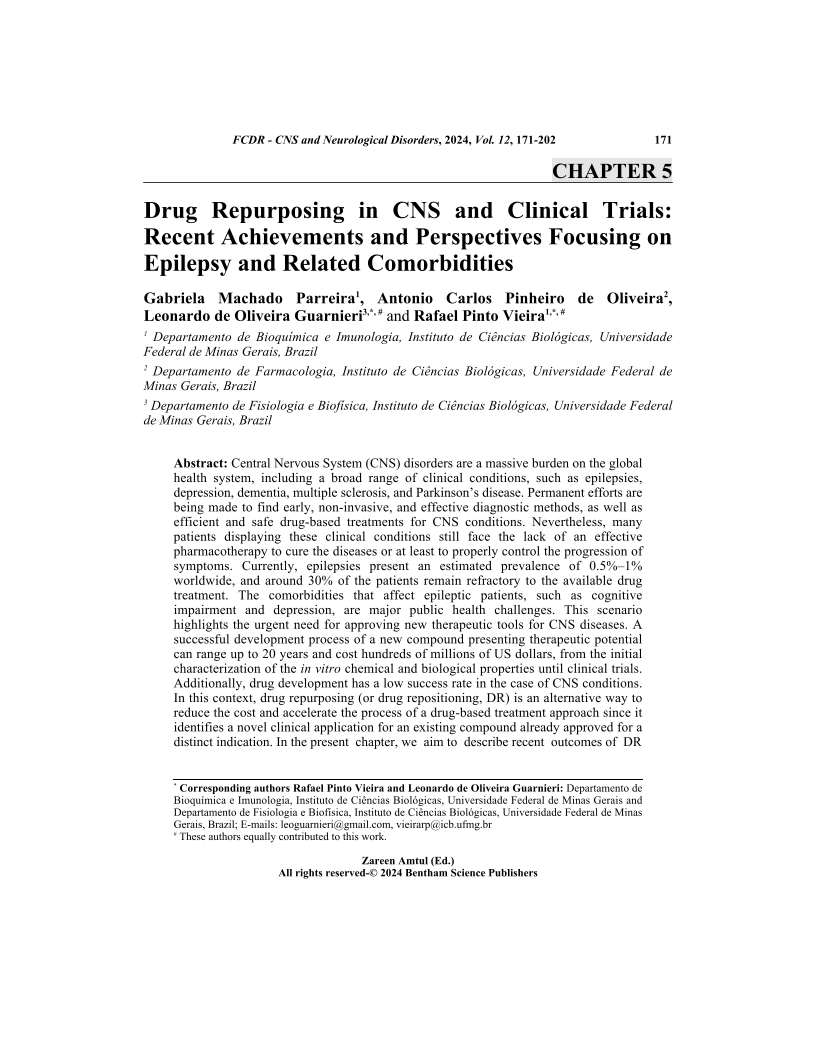Drug Repurposing in CNS and Clinical Trials: Recent Achievements and Perspectives Focusing on Epilepsy and Related Comorbidities

- Authors: Gabriela Machado Parreira1, Antonio Carlos Pinheiro de Oliveira2, Leonardo de Oliveira Guarnieri3, Rafael Pinto Vieira4
-
View Affiliations Hide Affiliations1 Departamento de Bioqumica e Imunologia, Instituto de Cincias Biolgicas, Universidade Federal de Minas Gerais, Brazil 2 Departamento de Farmacologia, Instituto de Cincias Biolgicas, Universidade Federal de Minas Gerais, Brazil 3 Departamento de Fisiologia e Biofsica, Instituto de Cincias Biolgicas, Universidade Federal de Minas Gerais, Brazil 4 Departamento de Bioqumica e Imunologia, Instituto de Cincias Biolgicas, Universidade Federal de Minas Gerais, Brazil
- Source: Frontiers in Clinical Drug Research - CNS and Neurological Disorders: Volume 12 , pp 171-202
- Publication Date: March 2024
- Language: English
Drug Repurposing in CNS and Clinical Trials: Recent Achievements and Perspectives Focusing on Epilepsy and Related Comorbidities, Page 1 of 1
< Previous page | Next page > /docserver/preview/fulltext/9789815179842/chapter-5-1.gif
Central Nervous System (CNS) disorders are a massive burden on the global health system, including a broad range of clinical conditions, such as epilepsies, depression, dementia, multiple sclerosis, and Parkinsons disease. Permanent efforts are being made to find early, non-invasive, and effective diagnostic methods, as well as efficient and safe drug-based treatments for CNS conditions. Nevertheless, many patients displaying these clinical conditions still face the lack of an effective pharmacotherapy to cure the diseases or at least to properly control the progression of symptoms. Currently, epilepsies present an estimated prevalence of 0.5%1% worldwide, and around 30% of the patients remain refractory to the available drug treatment. The comorbidities that affect epileptic patients, such as cognitive impairment and depression, are major public health challenges. This scenario highlights the urgent need for approving new therapeutic tools for CNS diseases. A successful development process of a new compound presenting therapeutic potential can range up to 20 years and cost hundreds of millions of US dollars, from the initial characterization of the in vitro chemical and biological properties until clinical trials. Additionally, drug development has a low success rate in the case of CNS conditions. In this context, drug repurposing (or drug repositioning, DR) is an alternative way to reduce the cost and accelerate the process of a drug-based treatment approach since it identifies a novel clinical application for an existing compound already approved for a distinct indication. In the present chapter, we aim to describe recent outcomes of DR aiming at CNS pathological conditions, especially discussing the recent clinical trials and their impacts on future endeavors in the search for the management of epilepsies and related comorbidities.
-
From This Site
/content/books/9789815179842.chapter-5dcterms_subject,pub_keyword-contentType:Journal -contentType:Figure -contentType:Table -contentType:SupplementaryData105

